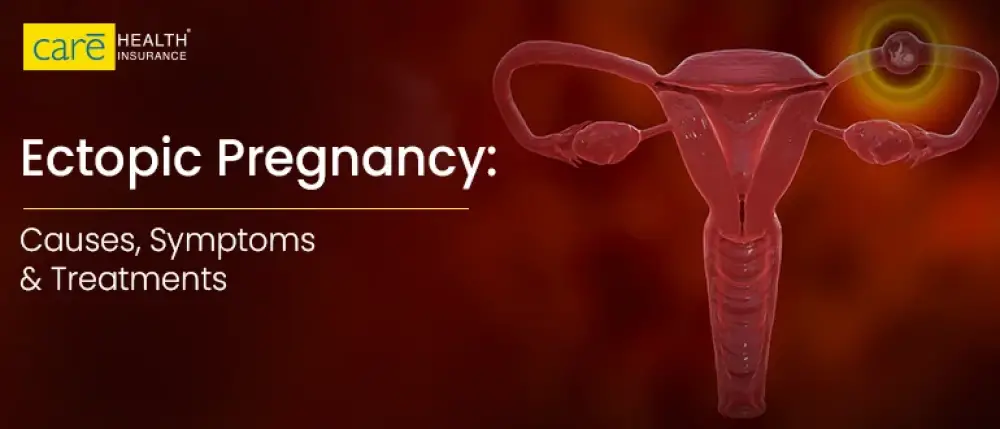Subscribe to get weekly insights
Always stay up to date with our newest articles sent direct to your inbox
Published on 8 Jan, 2025
Updated on 11 Dec, 2025
780 Views
5 min Read

Written by Jagriti Chakraborty
Reviewed by Nidhi Goyal
favorite2Likes
An ectopic pregnancy can be confusing, it can be frightening and sometimes challenging to recognise, particularly in the initial weeks when symptoms might look like those of a typical pregnancy. Recognising the condition early can have a substantial impact on the outcome.
Ectopic pregnancies are the primary cause of women's death in the initial stages of the first trimester, causing about 5%-10% of all pregnancy-related deaths. In this situation, while the fetus itself cannot survive beyond a few weeks, the pregnancy, if continued, can cause acute pain and pose life-threatening risks to the mother’s life.
Because an untreated ectopic pregnancy is a medical emergency, knowing what an ectopic pregnancy is, the warning signs, and key ectopic pregnancy symptoms is crucial for timely treatment and reducing the risk of any future complications.
In an ectopic pregnancy, the fertilised egg implants and develops outside the uterus. This can occur in the fallopian tubes, ovaries, abdominal cavity, or cervix.
Unlike normal pregnancies, an ectopic pregnancy cannot progress correctly. When the fertilised egg implants in the fallopian tube, it lacks the space to grow. Similarly, if implantation occurs in the cervix, ovaries, or abdomen, there may be an insufficient nutrient supply for proper development.
In most cases, the fetus does not survive beyond 12 weeks. If the affected organ, often the fallopian tube, ruptures, it can lead to severe consequences, such as bleeding, acute pain, vaginal bleeding, dizziness, nausea, and, in critical cases, even death.
The early stages of an ectopic pregnancy resemble a typical pregnancy, but certain signs of ectopic pregnancy can assist you in identifying the condition early.
Several factors contribute to the development of ectopic pregnancy:
Ectopic pregnancies are classified based on where the fertilised egg implants.
Ectopic pregnancy carries various risk factors, which can also affect future pregnancies. Here are some factors that may increase the risk:
Diagnosing ectopic pregnancy involves a combination of methods, and early detection is critical to prevent complications. Primary diagnostic methods include:
The treatment methods for Ectopic pregnancy depend on the severity. In the early stages, medications can be effective, but if the condition becomes more complex, the doctor may recommend surgical procedures to avoid further risks and complications.
Let us have an overview of the procedures followed during the Ectopic pregnancy surgery:
While not always preventable, you can minimise the risk by:
>> Read More: How to Avoid Preeclampsia: A Quick Pregnancy Guide
Understanding ectopic pregnancy symptoms, causes, and treatments is essential for safeguarding reproductive health, and early detection can make all the difference. But pregnancy-related emergencies can be unpredictable, making financial preparedness crucial.
Maternity health insurance provides specialised cover for pregnancy and childbirth costs, including checkups, scans, consultations, No Claim Bonanza, and hospitalisation for delivery. In our Care Joy Today and Care Joy Tomorrow plans, we offer lifelong renewal with 9-month and 24-month maternity waiting periods, respectively. You get coverage for room rent, ICU, prenatal and postnatal expenses, ambulance cover, and more. These ensure timely, high-quality care free from financial stress.
So, stay aware and stay prepared with maternity insurance, which safeguards your health and assists your motherhood journey.
Disclaimer: The above information is for reference purposes only. Kindly consult your general physician for verified medical advice. The health insurance benefits are subject to policy terms and conditions. Refer to your policy documents for more information
Thyroid : मामूली नहीं हैं महिलाओं में थायराइड होना, जानें इसके लक्षण और घरेलू उपचार Vipul Tiwary in Diseases
शुगर कंट्रोल कैसे करे? जानें, डायबिटीज में क्या खाना चाहिए Vipul Tiwary in Health & Wellness
हाई ब्लड प्रेशर को तुरंत कंट्रोल कैसे करें? देखें इसके उपाय Vipul Tiwary in Diseases
पैरों में दर्द किस कमी से होता है? जानें, इसके घरेलू इलाज Vipul Tiwary in Health Insurance Articles
Cold Hands? Act Immediately Against Raynaud’s Phenomenon Jagriti Chakraborty in Diseases
Understanding Azotemia: Meaning, Causes, Treatment & ICD 10 Guide Leena Khowal in Diseases
Leukaemia vs. Lymphoma Breakdown: What Sets Them Apart Leena Khowal in Diseases
When Silent Clots Threaten Your Life: DVT Pratham Gupta in Diseases
Ectopic pregnancy may be suspected if early pregnancy symptoms are associated with sudden abdominal pain, abnormal spotting, or dizziness. It’s a warning to seek urgent medical attention.
No, an ectopic pregnancy cannot resolve on its own. It requires prompt medical treatment to avoid life-threatening complications.
An ectopic pregnancy is often detected as early as 4–6 weeks using early hormone level checks and internal pelvic scanning.
Blocked or damaged fallopian tubes are one of the primary causes of ectopic pregnancy.
Always stay up to date with our newest articles sent direct to your inbox
Loading...